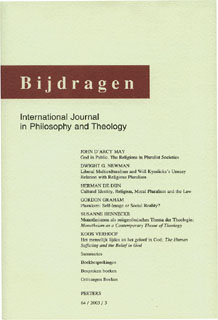 previous article in this issue previous article in this issue | next article in this issue  |

|
Document Details : Title: Baander en Schelling over Descartes en Spinoza - Baader and Schelling About Descartes and Spinoza Subtitle: Fundamentele, theologisch gemotiveerde vragen bij de grondslagen van de moderniteit - Fundamental, Theologically Based Remarks Concerning the Origins of Modernity Author(s): GELDHOF, Joris Journal: Bijdragen Volume: 66 Issue: 3 Date: 2005 Pages: 301-325 DOI: 10.2143/BIJ.66.3.2002070 Abstract : At a time when Hegel completed the project of modern philosophy in Berlin, two of his contemporaries, Schelling and Baader, formulated a vehement critique of modernity. Both teaching at the University of Munich, these profound authors developed, in their writings of the 1830s, a comprehensive standpoint that claimed to be faithful to Christianity. In order to do so, Baader and Schelling thought it necessary to challenge the very origins of modern thought. In this contribution, it is argued that both thinkers ultimately relied on theological convictions to develop their painstaking analysis of Cartesianism and Spinozism. Hence, it is demonstrated that there is more at stake here than mere intellectual discussions or inherent philosophical debates. With a view to Descartes’ epistemology and metaphysics, Baader and Schelling rejected the consequent focus on the ‘cogito’, as well as the proof(s) for God’s existence. They also disagreed with Descartes’ separation between ‘res cogitans’ and ‘res extensa’, because it gave no account of the continuity between nature and conscience. As far as Spinoza is concerned, Baader and Schelling held that his metaphysical system did not essentially differ from Descartes’ rationalism and, accordingly, they repudiated it because of a lack of vitality. More important, however, is their critique on Spinoza’s concept of God, which they regarded as irreconcilable with a Christian notion of God as creator and redeemer. |
